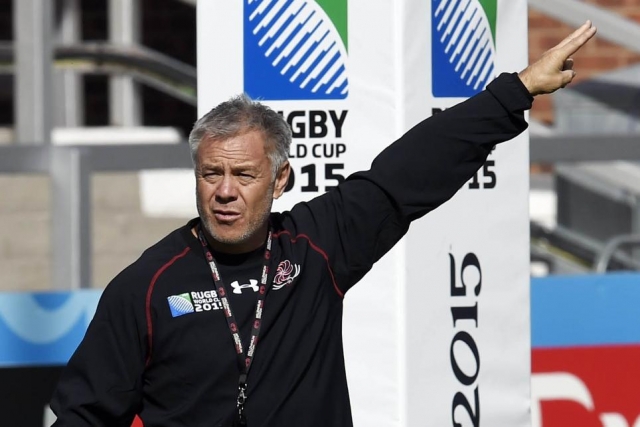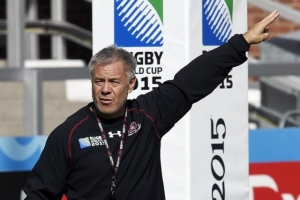Haig’s Georgia Breaking Down Barriers of World Rugby
It has been an historic year for Georgian rugby, so it comes as little surprise that head coach Milton Haig is feeling ever so slightly worn out as 2015 draws to a close.
“I’m a bit fatigued from four and a half months focusing on the World Cup, I’ve been in a bubble,” says the New Zealander with a smile that seldom leaves him in the hour and a half we spend in his office at Shevardeni Stadium in Tbilisi.
“It was such an engulfing experience, as all your thoughts and energy go into it. The poor old family take a bit of a back seat to the goal of qualifying automatically for 2019,” he adds.
This, as no Georgian should need reminding, was a goal the Lelos accomplished at the tournament in England in September and October.
Victories over Tonga in Gloucester and Namibia in Exeter, either side of losses to Argentina and eventual champions New Zealand, were enough to earn Georgia a first-ever third-placed finish in a World Cup group thereby securing automatic qualification for the next edition in Japan in 2019.
“We had a single focus going into the tournament and that was to win the games against Tonga and Namibia. Clearly, we wanted to put in good performances in the other games, but this focus on two wins really kept us on track.
“Before the tournament we looked at all the groups from the last two World Cups and found that 8-12 points secured at least third place – so the target became two wins,” reveals Haig whose men attracted widespread acclaim from rugby pundits, not only for their surprise defeat of Tonga but also the way in which they competed against New Zealand in Cardiff.
A Kiwi himself, Haig previously described the chance to coach against the All Blacks at a World Cup as a dream come true. When the reality came, Georgia didn’t disappoint, giving the All Blacks an early scare before bowing out 43-10 in Cardiff, a result which grew in respectability when New Zealand thrashed France by a greater margin soon after.
Now world leaders in the game by some distance, Haig places much faith in the rugby coaching philosophy from his homeland.
“The New Zealand way of coaching emphasizes technical knowledge and confidence. If you have a good player, and give him confidence in his ability, he becomes a very good player,” he explains.
The Georgian head coach intends to spread the New Zealand approach among Georgia’s coaches and he will take four coaches to his native country this December to see first-hand how two top New Zealander clubs (the Blues and the Chiefs) train.
Thereafter, he will spend Christmas back home with his wife and two daughters, all of whom are enjoying life in Georgia.
“Having lived here for four years, you get submerged in the culture and there’s no doubt that if the family and I left tomorrow, there are many things we would really miss about Georgia,” adds Haig who has been relentlessly promoting Georgia and its rugby to the world’s media at every opportunity.
Looking to the next step for Georgian rugby on its upward trajectory, it is no secret that the target is to break in to the prestigious Six Nations championship, held annually between England, France, Ireland, Italy, Scotland and Wales.
But demolishing a comfortable and lucrative status quo is a formidable challenge, something of which Haig is only too aware.
“They’ve got a nice little package which brings in lots of money to the countries involved. Why would they want to split the financial share a seventh way (by inviting Georgia)?
“These organizations don’t tend to move quickly. But in 3-4 years the current setup could become stale and they’d be forced into change. There IS a history of rugby in Eastern Europe, not only here but also in Romania and other countries,” pleads Haig on one of European rugby’s hottest issues.
“I don’t think the promotion/relegation idea has any chance, it would have to become a seven or eight nations. Seven nations would still fit into the calendar, and would still fill stadiums,” adds the New Zealander who will know that by the time Georgia do beat down the door to Europe’s rugby elite, he will probably have moved on.
Where to, he is not sure although he cites Japan as a possibility due to its relaxed league schedule and shorter travel time back to New Zealand. When I ask whether he’d be looking more east than west, Haig claimed it would depend on what was on the table and that “there are some nice spots in the south of France!”
For now though, his focus is Georgia providing his contract, which expires at the end of this year, is renewed. Georgian Rugby Union president Giorgi Nijaradze has stressed his desire to keep Haig in place, but won’t conclude contract formalities until the GRU’s presidential elections are held in December.
It seems inconceivable that Nijaradze won’t prevail having overseen a remarkable boom in Georgian rugby since taking over as president in 2008. Indeed, at the time of writing, no opposing candidates had been confirmed.
Therefore, Haig, a fundamental part of said advancement, will almost certainly remain in charge beyond his highly impressive first four years in the role.
“I gave myself at least six years. We are only just arriving at where we need to be. We’re another good two years off where we want to be. Georgia are hosting the 2017 World Under-20 Championships and I want to be here for that, and be involved in some capacity. This is a really big event for Georgian rugby,” says Haig.
Leading Georgia to another World Cup is something that is clearly also in Haig’s mind, as he outlines that 70% of the 2015 squad ought to be available for World Cup selection in just under four years’ time.
But in the immediate term, Georgia’s focus is the comparatively modest European Nations Cup in which they host Germany next February in their next fixture.
“Now we have a chance to have a look at some younger players, and we will also have the chance to show the Georgian crowds that the World Cup was no one off – we have taken it to another level. So we’ll play some good rugby and the players can enjoy playing in front of the home crowd,” adds Haig, managing to put a positive focus on what may feel like quite a comedown from the World Cup history-making of recent months.
Nevertheless, with World Rugby committing to giving Georgia test matches against tier 1 nations in the coming years, Haig’s Lelos will (literally) be rubbing shoulders with the world’s best on a more regular basis from now on and few would deny that they deserve the opportunity.
Alastair Watt












